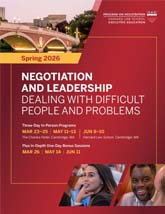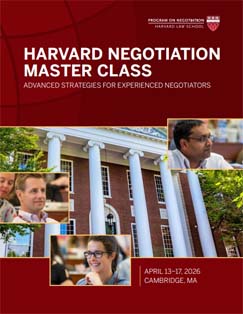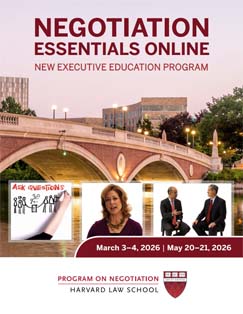Deceptive tactics in negotiation can run rampant: parties “stretch” the numbers, conceal key information, and make promises they know they can’t keep. The benefits of negotiation in business offer strong incentives to detect these behaviors. Unfortunately, however, most of us are very poor lie detectors.
… Read More 
Learn how to negotiate like a diplomat, think on your feet like an improv performer, and master job offer negotiation like a professional athlete when you download a copy of our FREE special report, Negotiation Skills: Negotiation Strategies and Negotiation Techniques to Help You Become a Better Negotiator, from the Program on Negotiation at Harvard Law School.
principled negotiation
What is Principled Negotiation?
Principled negotiation, as described in the bestselling negotiation book Getting to Yes, encourages us to share and explore the deeper interests underlying our stated positions.
When negotiators disagree about an issue, consulting objective criteria can be a lot more productive than adversarial bargaining. This “principled negotiation” involves drawing on principles and objective criteria to settle differences rather than making opinion-based arguments.
When you discuss your area of disagreement through the lens of independent standards, you sidestep the common temptation to defend your own position and tear down the other party’s. In the process, you increase your odds of coming together—both in the short term and during the life of any agreement you reach.
There are four main elements of principled negotiation:
1. Separate the people from the problem. In principled negotiation, negotiators work to deal with emotions and personality issues separately from the issues at stake.
2. Focus on interests, not positions. Look beyond hard-and-fast positions to try to identify underlying interests—basic needs, wants, and motivations.
3. Invent options for mutual gain. In principled negotiation, negotiators devote significant time to brainstorming a wide range of possible options before choosing the best one.
4. Insist on using objective criteria. It’s common in negotiation for parties to argue back and forth about whose “facts” are correct. This type of argument is likely to end in either impasse or an inefficient compromise.
The more you bring standards of fairness, efficiency, or scientific merit to bear on your particular problem, the more likely you are to produce a final package that is wise and fair.
In our special free report – The New Conflict Management: Effective Conflict Resolution Strategies to Avoid Litigation – renowned negotiation experts uncover unconventional approaches to conflict management that can turn adversaries into partners. Download your copy right now, and we’ll notify you by email when we post new conflict resolution advice and information.
The following items are tagged principled negotiation:
Using Principled Negotiation to Resolve Disagreements
Parties can often reach a better agreement through integrative negotiation—that is, by identifying interests where they have different preferences and making tradeoffs among them. If you care more about what movie you see tonight, but your friend cares more about where you have dinner, for example, you can each get your preference on the issue … Read More 
Principled Negotiation: Focus on Interests to Create Value
Inexperienced negotiators and even many experienced negotiators tend to assume they have a choice between two main strategies: negotiate in a tough, demanding manner or in a friendly, accommodating manner. In fact, there’s a better, third way of negotiating—one that doesn’t rely on toughness or accommodation, but that will improve your likelihood of meeting your … Read More 
Teaching Contract Negotiation: Using the Mutual Gains Approach
How do you use the mutual gains approach in contract negotiations?
In contract negotiations, parties can often resort to positional bargaining instead of using the mutual gains approach. Teaching students to generate creative options in contract negotiations can help them avoid positional bargaining and achieve more beneficial and sustainable agreements. The Teaching Negotiation Resource Center (TNRC) … Read More 
What an Operatic Role-Play Simulation Can Teach You About Negotiation
A distinguished older soprano, Sally has not had a lead role in two years. However, when another soprano falls ill, the Lyric Opera is eager to hire Sally…but at what price?
Sally Soprano is one of the best-known role-play simulations from the Program on Negotiation’s Teaching Negotiation Resource Center (TNRC). And it’s a classic for good … Read More 
Add Variety to Your Curriculum with These Top Simulations
Update Your Teaching Materials with Our Top Negotiation Role Play Simulations
The field of negotiation is constantly evolving, and as such, requires new ways of teaching negotiation. It can sometimes happen that students come into a class having already encountered the negotiation simulation being used in the course, or that a different kind of exercise is … Read More 
Teaching Negotiation Videos – All Downloadable!
Have you been energized by the unique “aha” moment students experience when negotiation videos are used in their class? Us too!
… Read Teaching Negotiation Videos – All Downloadable! 
Teach Your Students Dispute Resolution for Their Everyday Lives
Negotiation refers to the process of working out agreements that meet each party’s needs and address their interests. People negotiate all the time in their everyday lives: in the workplace, within families, and when buying goods and services. Knowing which negotiation strategies to use in different circumstances can make a significant difference. The Teaching Negotiation … Read More 
Hong Kong Lawyer Benny Tai Inspired by Harvard Negotiation Project Authors
The Harvard Negotiation Project was recently mentioned in the Wall Street Journal by David Feith in his interview with Benny Tai, “China’s New Freedom Fighters.”
Benny Tai, a 49 year old lawyer who has been branded an “enemy of the state,” founded Occupy Central with Love and Peace, a group that promotes civil disobedience in order … Read More 
Why Classic Cases?
Why are some negotiation exercises still used in a great many university classes even twenty years after they were written? In an effort to understand more about the enduring quality of some classic teaching materials, we asked faculty affiliated with PON to explain why they think some role play simulations remain bestsellers in the Clearinghouse … Read Why Classic Cases? 



